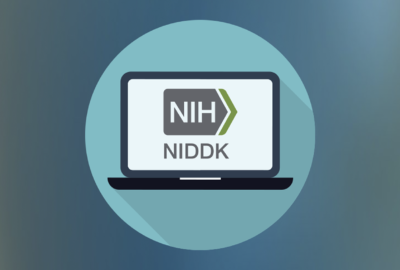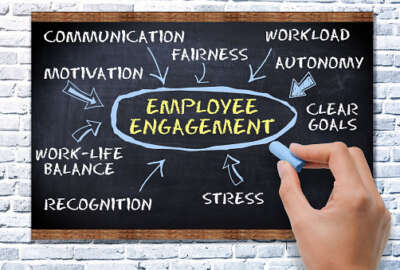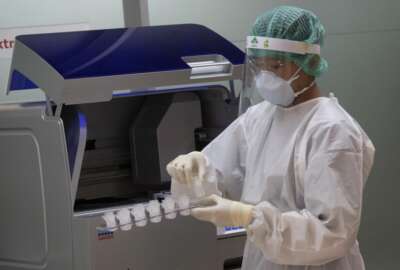NIH health executive also a diversity champion
After more than 30 years at the National Institutes of Health, the next guest has been recognized by the Senior Executives Association with the 2023 Spirit of...
After more than 30 years at the National Institutes of Health, the next guest has been recognized by the Senior Executives Association with the 2023 Spirit of Excellence award for diversity, equity, inclusion and accessibility. The Federal Drive with Tom Temin talks with National Institute of Neurological Disorders and Stroke executive officer Maryann Sofranko.
Interview Transcript:
Tom Temin And let’s begin with your main job, and that is executive officer of the institute. What does the executive officer do? Sounds like you keep the trains running for the scientists.
Maryann Sofranko For sure. So I would say that the executive officer role is really the infrastructure that does support the science that’s done at NINDS. We basically support all of the administrative services from funding the science to purchasing the supplies and equipment needed for the science to ensuring that our investigators can travel and making sure that the funding goes out to our extramural investigators. So we do all the administrative work behind the scenes to keep things moving forward in advancing the science.
Tom Temin There’s something about NIH that keeps people there for entire careers or decades at a time, isn’t there?
Maryann Sofranko I think so. I think it’s the mission. How can you not get excited about the mission of really moving science forward and the whole bench to bedside concept where we actually are doing the research on site, as well as funding it in our extramural communities. And then you see that translate into health improvements across our nation and across the world. So it’s a really exciting mission for sure.
Tom Temin All right. So let’s get to the SCA award that you got, the Senior Executives Association, the Spirit of Excellence for Diversity, Equity, Inclusion and Accessibility. I know that’s a administrative policy word, and it’s sort of pasted all over the place. What does it mean to you at the Institute and in your work?
Maryann Sofranko Yeah, in my work at NIH, I also wear another hat, and that hat is the business liaison to our Project Search program. And Project Search is really a program that is a training to work program for young adults with disabilities. So being able to really spearhead and lead that program as part of the business partner at NIH is really, really rewarding. We have our numbers in that program are pretty substantial. Over the 13 years the program has been at NIH, we have had over 100 interns that have come through the program. And the program, as I mentioned, is really a training to work program where we as the business liaison piece, provide rotational opportunities. So really on the job training for interns. And it is 30 week program where they get three, in addition to classroom activities, they get three rotational opportunities to really learn skills, kind of hone skills so that they are really ready to work at the end of that program. Not everyone gets hired, but our numbers are really high. We have about a 78% higher rate out of that program. And so really being able to bring those young adults into the work environment is amazing and it truly diversifies our work environment in so many different ways.
Tom Temin What are the techniques and strategies you have for getting the raw material in the people themselves to the program? How do you reach out?
Maryann Sofranko We are one of the partners in that three prong program. We actually partner, which is our local adult rehabilitation partner, as well as Ivymount. And there’s actually a process by which people apply to be part of this program. And the program we have some sister programs and one in Montgomery County with the government and one at the Smithsonian in D.C. And so we partner with them to bring each about six interns per rotation cycle into the program. So it’s usually somewhere in the ballpark of about 18 to 20 interns per year get selected out of many, many that apply.
Tom Temin Sure. We’re speaking with Maryann Sofranko. She’s executive officer of the National Institute of Neurological Disorders and Stroke. She’s also the recipient of the 2023 Spirit of Excellence Award for Diversity, Equity, Inclusion and Accessibility from the Senior Executives Association. And the idea of disabilities or those with disabilities, that itself has become a wider field in recent years, hasn’t it?
Maryann Sofranko Absolutely. And the goal of the program that we were just talking about, Project Search, is not only to ensure that young adults with disabilities are trained so that they can be employable, but also that program actually teaches life skills so that we are creating an environment where people can start to live on their own and have the life skills to do so. So it’s really a comprehensive program to support this young adult population.
Tom Temin And we understand for many years the government has hired people that are sight impaired or blind, or hearing impaired or deaf, and we understand the types of accommodations. Especially technically, but also socially that have to be made for people like that. But lately in this kind of relates to the institute itself, the neuro diversity has come in to the lexicon and people that are neurodiverse tell us the scope of that, what it means and how those people get accommodated.
Maryann Sofranko Well, at NIH in general, we provide accommodations across the board for any staff who need them. So there’s a process by which they can go through to get accommodations, and it’s through our Equity Diversity and Inclusion office. And I think that NIH is probably one of the best employers out there looking across our organization to see how we can accommodate people so that we can diversify our staffing population. And those accommodations range, as you mentioned, from software that helps someone who can’t see as well as others to software where someone can speak into it. We provide anyone that needs an accommodation, we provide equipment, we provide chairs, furniture, whatever the need is. We definitely go above and beyond in trying to make sure that we can accommodate our staff.
Tom Temin But someone who might have autism at certain levels or a type of neuro diverse or neuro disability, I don’t know what the correct word is.
Maryann Sofranko Intellectual disabilities. That for sure was the focus of Project Search. Most of our interns that actually come through that program are intellectually disabled. So being able to match their skillset with the needs that we have and we actually have employment coaches on site who can look at our processes and break them down so that they can identify bits and pieces of processes that then the interns can do. And that actually frees up some of our other staff time to do things at a different level. So it’s a win-win. We’re able to take activities off the plates of staff that can work at a higher level and identify those activities and figure out really effective ways for the interns to plug and play their.
Tom Temin Is it also so that people that might have intellectual disabilities have like super capabilities in very narrow areas?
Maryann Sofranko Absolutely. Absolutely. We definitely find that some of our interns that come through the program have unique skills and we’re able to tap into those skills and figure out how to make them work. I mean, we have one intern currently who is really amazing with data. Although he struggles in some other areas, he’s able to manipulate data, analyze data, and provide really good solid data platforms so that then someone with the expertise can kind of summarize that and put out a really nice product with the data that’s being mined there. So we definitely tried to hone and we have experts, we have instructors and project search employment consultants who are able to really work with the interns to tap into what their unique skills are, as well as train and teach them new skills. So it’s a really nice program where we’re able to match up interns with positions that really fit their skillset.
Tom Temin It sounds like you have two passions, then one for the work on behalf of the institute itself and the other for this program that really benefits all of NIH.
Maryann Sofranko Yeah, absolutely. I started out in administration at NIH, and I’ve been there doing this work for over 30 years. But for sure, Project Search is a passion of mine and I love to see positive outcomes. And we work really hard with our rehabilitation provider as well as our instructors from Ivymount to make the program really successful. And thus far we’re continuing to expand. The program originally was founded in the Clinical Center at NIH. And it was, as you can imagine, pretty hospital centric in terms of hospital operations really lend themselves well to most of the skills that you’re going to see. But we have expanded it into the institutes and we’ve tapped into that unique skill set that you’ve talked about with some of the interns to be able to do work that is at a higher level. And so for sure, a passion, love to see it grow, love to see it be successful.
Copyright © 2025 Federal News Network. All rights reserved. This website is not intended for users located within the European Economic Area.
Tom Temin is host of the Federal Drive and has been providing insight on federal technology and management issues for more than 30 years.
Follow @tteminWFED






